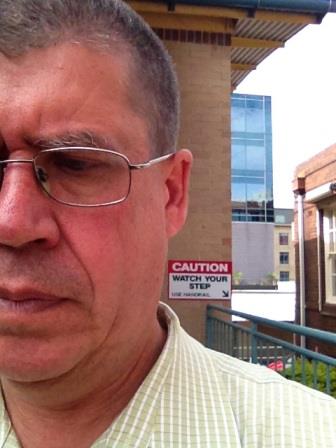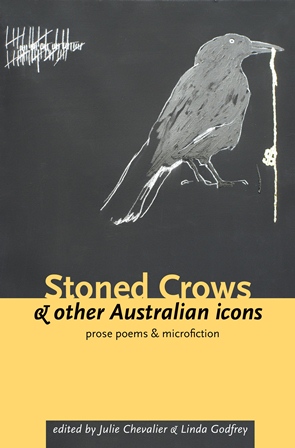 1. What inspired you to write the prose poem/microfiction which is published in Stoned Crows & other Australian icons?
1. What inspired you to write the prose poem/microfiction which is published in Stoned Crows & other Australian icons?
I wanted to communicate something about the nature of psychosis. This poem is a compressed recount of an actual walk around Sydney in May 2005 and it tries to show how real experiences conspire to create a delusional belief system. With Bipolar 1 mood disorder your cultural and religious baggage is often the stuff that distorts the most and so these sacred icons can take on significant new meanings. Inevitably this type of walking leads to the crash of an involuntary admission, but it can also lead to a useful poem!
Central Station is an iconic part of my life. I frequently travelled through this place as a university student from Wagga Wagga (the place of many crows!) in the late 70s and early 80s and it became a place I was drawn to and through any time I became restless, troubled, searching. I love the circular walk around the city that beckons as you emerge from Country Trains, with its many variations and seductions. Somehow Sydney is a safe place to be when you are exploring the edges of your madness.
The writing is also therapeutic I suppose. It helps me make sense of things and allows me to enjoy the creative edge that comes from the chaos.
2. Tell us about your process. (Do you start sparse and widen out, or do you write down every possible association and cut back? Do you research the subject matter you are writing about? Is it pure intuition?) Take us through an example if you want.
I have to be doing first. Creative thought only comes while I am doing something else. With this piece I needed to first recall the pathway of what was quite an extraordinary day. And from that I sought to compress the experience, sort of like a zip file, so that when opened the thing should hopefully expand in the mind of the reader. I collected a lot of artefacts that day, pieces of paper, post cards, books, pamphlets and of course the Opera House coat!
The final shape as a prose poem was inspired by the Spineless Wonders competition. For some time the poem existed as a typically narrow cascade of three line stanzas with some carefully crafted enjambment and visual effects. But this was a prose poem all along: as soon as the words filled the box it became clear that the sense of compressed experience was heightened. It also became clear that further simplification was necessary, like the removal of capitalised titles and italicised quotation.
3. What advice do you have for other writers about the first or last line? About how to choose the title? Do you follow any rules?
I like a last line that makes a fresh comment on all that has gone before it. Something peculiar, something that undercuts or enriches, that asks the reader to think again. First lines should take you to the action immediately. Titles need to entice further exploration and often the poem gives the title easily, as a phrase from the poem or as clever piece of self promotion.
4. Who or what inspires your writing?
It has always been about making sense of life. Early on it was all about love and a young man’s contradictory world. It was always political, having grown up with the Cold War in a country obsessed with hedonism. It is about what the natural world gives to you: the lines that just come from nowhere that end up as the beginning of a poem. It is about the worlds we have constructed and the worlds we have destroyed. It’s about madness, creativity, revelation. It’s like invisible threads of thought exist out there and sometimes you grasp one end, desperately.
5. Tell us what you do if you haven’t written anything in a while and you want to get started writing again? Could you share your favourite writing exercise with our readers?
There are often long periods of time when I don’t write poetry, because of the demands of full time work and the joys of family. Most often I need to walk and in the walking allow my mind to become uncluttered, so that thought can follow its natural inclination. I find it important to write down or record into my phone the phrases that appear. If I don’t do that they are reabsorbed into the ether.
I find competitions useful. The South Coast Writers Centre (SCWC) has been running a series of ekphrastic poetry events in conjunction with the Wollongong City Gallery and writing to these can be challenging and fun. The SCWC’s ‘Rocket Readings’ always get me re-enthused about writing and reading poetry. Themed events like those provided by Cordite Poetry Review and Australian Poetry give you something to write to.
Another favourite exercise is making something old new again.
